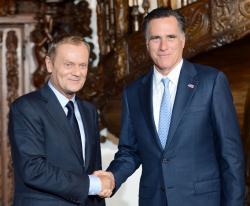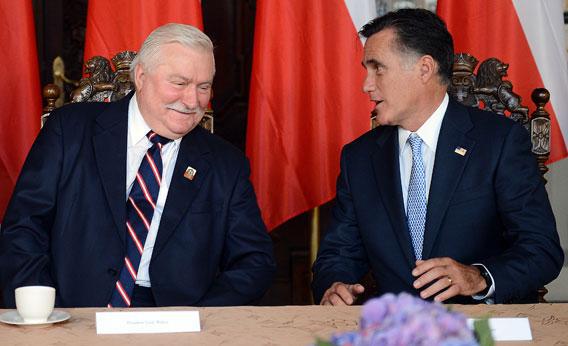The 2012 presidential election pits Mitt Romney against the 2009 winner of the Nobel Peace Prize. You’d forgotten about that, hadn’t you? The Obama campaign site makes no mention whatsoever of the Nobel. The president never talks about being in the company of Nelson Mandela and Aung San Suu Kyi and Yasser Arafat. Obama was a rare Nobel winner who engendered an immediate are-you-serious reaction from a former winner.
“So soon?” said former Polish President Lech Walesa, venting less than an hour after Obama won. “Too early. He has no contribution thus far. He is still at an early stage.”
Every American conservative had the same reaction. Finally. Here’s a real European hero who sees through Obama. Four months later, Walesa flew to Illinois and endorsed a Polish-American Republican candidate for governor, calling his Tea Party-flavored campaign “the new Solidarnosc.” Later in 2010, he warned that Obama’s United States was “getting weak” economically and “no longer leading politically or morally.” And then, this year, Walesa pointedly declined a meeting with the president. Why? “It would only amount to a photo opportunity.”
The Walesa drama helps to explain the role Poland plays in the anti-Obama argument. Conservatives see how Obama treats Israel, Britain, and Poland, and they see evidence of his deep-seated mistrust of the West. “Our visit to Poland,” said Romney foreign policy adviser Lanhee Chen to reporters last week, “comes at the gracious invitation of former President Lech Walesa.” Hint, hint.
The real-time policy reasons for the trip are few, but resonant. On Sept. 17, 2009, a month before the Nobel Committee’s announcement, the Obama administration put the kibosh on a planned missile defense shield over Eastern Europe. It was interpreted, there and here, as a sop to Russia. But what a sop! In history, Sept, 17 happened to be the day that the Soviets promised to “take all measures to extricate the Polish people from the unfortunate war into which they were dragged by their unwise leaders” and send tanks over the border. “The idea that we should renounce,” said Charles Krauthammer, “on the 70th anniversary of the Russian invasion of Poland, a security agreement that we had with Poland [because] of Russian objections is scandalously, indescribably amateurish.”
Conservatives here and in Poland have looked at every subsequent Obama administration move as a sell-out. Scrapping the missile shield was “a unilateral concession to the Russian government,” after the Poles had “courageously” agreed to set it up, according to Romney. “There’s no question that Obama has rattled some of our allies, like Poland, by talking about the flexibility he’d have in his second term on issues like missile defense,” Sen. Jon Cornyn, R-Texas, told me last week. “I expect that’ll be part of the larger discussion leading up to November.”
But Romney hasn’t said he’d restart the missile shield, and leadership in other countries who’d been part of the plan have moved on, so there’s got to be more to this. In May, the president issued a posthumous Presidential Medal of Freedom to the Warsaw Ghetto resistance hero Jan Karski. “Resistance fighters told him that Jews were being murdered on a massive scale,” said Obama, “and smuggled him into the Warsaw Ghetto and a ‘Polish death camp’ to see for himself.” Poland’s conservative-leaning government got understandably miffed about the “death camp” thing. Even after the White House walked it back, Prime Minister Donald Tusk demanded more. “When someone says ‘Polish death camps,’ ” he said, “it is as if there were no Nazis, no German responsibility, as if there were no Hitler.”

Photo by JANEK SKARZYNSKI/AFP/GettyImages.
And what sort of American doesn’t respect Poland? In the conservative history of the Cold War, Poles played an outsize role in defeating the Soviets because of their faith. Ronald Reagan, Margaret Thatcher, and Pope John Paul II formed a trinity; the politicians couldn’t have been as successful if the pope hadn’t stoked new religious and patriotic fervor with his 1979 trip back home. In 2010, famed Catholic convert Newt Gingrich produced and toured a documentary about John Paul II’s visit, Nine Days That Shook the World. He later told the New York Times of his fear that “the crisis of European civilization as militant, government-imposed secularism undermines and weakens Christianity.” More than half of Poles still attend church every week, the highest rate in Europe. They’re righteous in a way that other Europeans aren’t.
“I think Poles are very unhappy with the Obama administration,” Gingrich told me on Monday, during a pro-Romney campaign stop in northern Virginia. “They feel very, very much left in the lurch.”
Are they, though? The Polish political class is, and has been, more aligned with American conservatives than with the American left. When John Kerry left Poland out of the “coalition of the willing,” and George W. Bush chided him, people noticed. But Poles themselves aren’t turning on Obama. According to a Pew poll released last month—i.e., after the “death camp” flub—69 percent of Poles approve of the United States. That was higher than it was during any point in the presidency of George W. Bush, and only down 5 points from the highs of 2009.
What about Polish-Americans? They’re swing voters. Like Rebecca Kaplan pointed out this week, there are plenty of Ohio and Pennsylvania voters with consonant-laden names who want Poland to join the visa waiver program. But Romney didn’t need to promise anything to win over Lech Walesa. Today, at their grip-and-grab session, Walesa announced his side in the international culture wars.
“Governor Romney, get your success,” said Walesa. “Be successful!”
